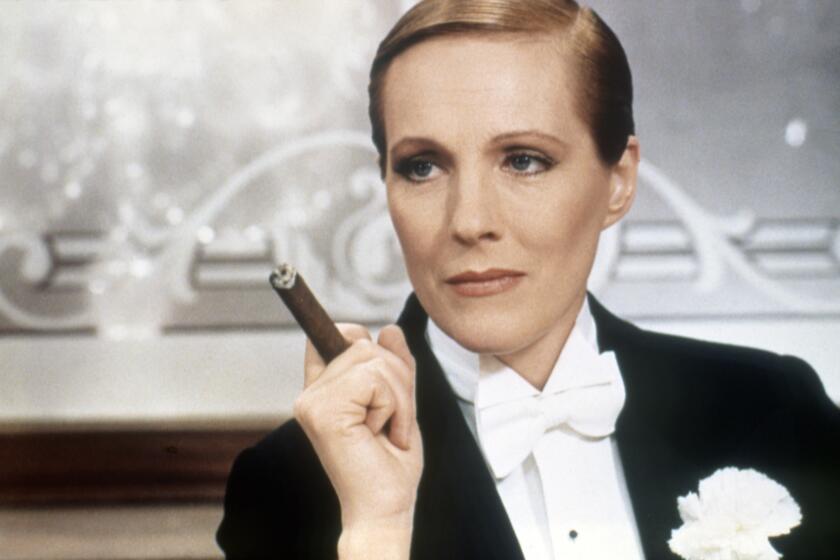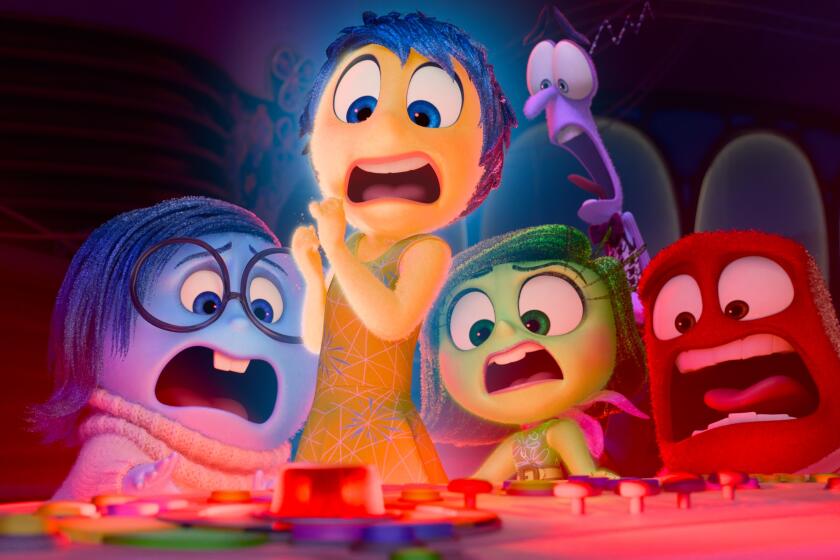Review: Jean-Luc Godard coolly dissects modern bourgeois life in the digitally restored ‘Une Femme Mariée’
Like a sleek novella amid dime-store paperbacks, Jean-Luc Godard’s 1964 movie “Une Femme Mariée” (A Married Woman) is the French filmmaker’s coolly intellectual, artistic dissection of modern bourgeois life that gets overlooked in his prolific ‘60s output, coming as it does between the gangster verve of “Band of Outsiders” and the jagged sci-fi noir of “Alphaville.” And yet it remains a thoughtful, probing exercise in erotic stagnation — no less engaging for lacking pulpiness. As a digitally restored version makes its way into theaters, and onto Blu-ray next month, its neglected status will hopefully improve.
Godard’s subject is the percolating dissatisfaction of Charlotte (Macha Méril), a beautiful woman married to the attentive and jealous Pierre (Philippe Leroy) yet driven to meet an actor named Robert (Bernard Noël) in hotel rooms. Godard wastes no time making his point about sex turned presentational and mechanical: The fragmented opening assemblage of fade-outs and fade-ins is of hands, legs, faces and lips in modes of caress, but displayed like close-ups of posed mannequins. Charlotte and Robert are ostensibly together, their bodies act it out, but her mind — asking questions, worriedly assessing her schedule — is elsewhere.
As Charlotte continues her day, which involves picking up Pierre at the airport from his trip with a colleague to the Auschwitz trials in Frankfurt and preparing for a hosted dinner, Godard is nothing if not upfront about mixing personal turmoil and world upheaval and stretches out his thoughts on the movie’s true culprit: consumer culture, a readily available parade of visuals and text dictating how lives are to be lived, and enjoyed.
Characters routinely push products and remedies on each other (Charlotte’s obsession being bust enhancement), and defend their economic status or philosophical beliefs like practiced salespeople. In a brilliantly stylish, modernist sequence at a pool, a melancholic Charlotte — flipping through an undergarment catalog — overhears two sexually naïve teenage girls discuss an upcoming rendezvous with a boy, while her imagined interjections of forlorn advice become ghostlike subtitles in the center of the frame. Her desire to communicate is literally stifled. During a montage of magazine ads, Godard lays over a Sylvie Vartan pop song, the refrain of which — “When the film is sad, it makes me cry” — speaks directly to a noted provocateur’s then-evolving feelings about cinema as both pleasure art and manipulation tool.
SIGN UP for the free Indie Focus movies newsletter >>
Though “A Married Woman” is Godard at his most considered and theme-savvy, it’s also loosely comedic and emotional in ways his other movies aren’t (and aren’t meant to be). Charlotte is a palpably lonely figure, exquisitely trapped by romantic convention and the call of marketing forces swirling around her. The overall effect is of a character study, a polished critique and — considering Godard’s folding-in-on-itself schemes — its own cinematic ad of sorts for the art film of its day. Yet it feels connected to our current media-saturated, reflection-less world too. When Charlotte says she prefers the present to the past, it’s because “there’s no time to think.”
------------
‘A Married Woman (Une Femme Mariée)’
In French with English subtitles
Running time: 1 hour, 35 minutes
Not rated
Playing: Landmark NuArt, West Los Angeles, one week only
More to Read
Only good movies
Get the Indie Focus newsletter, Mark Olsen's weekly guide to the world of cinema.
You may occasionally receive promotional content from the Los Angeles Times.










